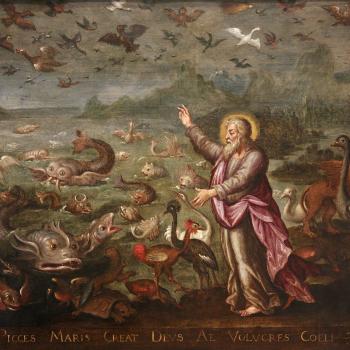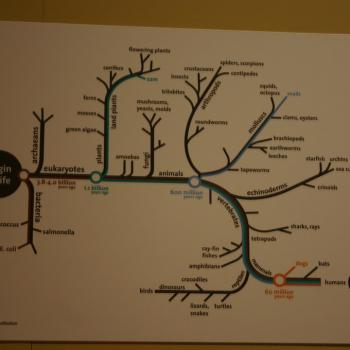
Perhaps one of the greatest contributions of Paul to Christian theology is his proclamation that Christians should be free from all extreme legalistic expectations. What is good is important, but there are many ways of acting upon the good, some being better than others. Christian liberty allows the exploration of those various goods so long as they remain good and honorable. What is best will not be achieved, indeed, cannot be achieved, by all, and various virtues, which are worthy of adherence, are not to be demanded by all Christians. Celibacy is one such good: “Now concerning the matters about which you wrote. It is well for a man not to touch a woman” 1 Cor. 7:1 RSV). Most people are unable to attain this virtue, nor are they expected to try to do so. For them, Paul affirmed that marriage is good and honorable. He exhorts Christians to consider following him in overcoming marriage bonds, but he concedes that such a virtue is not for everyone: “I wish that all were as I myself am. But each has his own special gift from God, one of one kind and one of another” (1 Cor. 7:5 RSV).
It is, in part, in this context, that Paul wrote to affirm Christians can eat meat: that is, he opposed a rigorous legalism which demanded Christians entirely reject the consumption of animal flesh (cf. 1 Cor. 8:1-13; Rom 14:1-3, 20-21). Such liberty in diet is so normalized, Christians in general have forgotten the fact that many early Christians abstained from eating meat. Tradition suggests none other than the stepbrother of Jesus, James, was a strict vegetarian; Eusebius, in his Church History, like St. Jerome in his On Illustrious Men, quoted St. Hegesippus (c.110-180) from his Memoirs, indicating how James was indeed a vegetarian:
He was holy from his mother’s womb; and he drank no wine nor strong drink, nor did he eat flesh. No razor came upon his head; he did not anoint himself with oil, and he did not use the bath.[1]
It was not just James. There are various indications which suggest other apostles and early disciples of Christ were, or became, vegetarian, with some sources being more reliable than others. For example, St. Matthew, according to St. Clement of Alexandria, also followed a vegetarian regimen: “Accordingly, the apostle Matthew partook of seeds, and nuts, and vegetables, without flesh.” [2] Likewise, when we read various early Christian historians, we find out that such vegetarianism was not found merely in the apostolic age, but in the time of the early martyrs. Thus, Eusebius, writing about the death of St. Biblias, showed that her abstinence of meat demonstrated the charges against Christians eating children was false:
But the devil, thinking that he had already consumed Biblias, who was one of those who had denied Christ, desiring to increase her condemnation through the utterance of blasphemy, brought her again to the torture, to compel her, as already feeble and weak, to report impious things concerning us.
But she recovered herself under the suffering, and as if awaking from a deep sleep, and reminded by the present anguish of the eternal punishment in hell, she contradicted the blasphemers. ‘How,’ she said, ‘could those eat children who do not think it lawful to taste the blood even of irrational animals?’ And thenceforward she confessed herself a Christian, and was given a place in the order of the witnesses.[3]
We could explore many other sources to find out that several ancient Christians, including at least some of the apostles, seemed to prefer a vegetarian diet. There were many different reasons for this. Roger Beckwith in his article,” The Vegetarians of the Therapeutae, and the Motives for Vegetarianism in Early Jewish and Christian Circles,” suggested five main explanations why some Jews and Christians turned towards a vegetarian first.
The first, which relates to Paul’s argument, was to avoid idolatry:
Vegetarianism as a precaution in an idolatrous environment. In Dan. 1,5-16, Daniel and his companions, exiled in Babylon, resolve not to ‘defile’ themselves with the king’s food or the wine that he drank, and therefore request ‘pulse’ (or ‘herbs’) and water instead. [4]
The second was that some Christians preferred an ascetical form of life, to live with simplicity and to avoid costly food.[5] The third, which Beckwith suggested is the form most in common with modern vegetarian thought, was the desire to live non-violently:
The vegetarianism of the non-violent. Philo also in one place expresses vegetarian sentiments of his own. This is in De Providentia, Fragment 2, 69-70, where he says that the temperance and self-control of the wise man are best shown by refraining from flesh-food, since to feast upon animals is to ‘change himself into the savagery of wild beasts.’ It is here we come nearest to the motives of modern vegetarianism.[6]
The fourth and fifth relate to the temple: some became vegetarians as a way of mourning the destruction of the temple, [7] while others did so as a way to oppose the temple and the sacrificial system.[8]
Paul, writing in this milieu, seeing that there were some promoting total abstinence of flesh without any qualification or consideration, wrote against such legalism, overturning what he believed was their main theological flaw: the concern to avoid idolatry. Paul noted that Christians should not be superstitious, fearing the influence of demons when they ate meat; yes, much meat was sacrificed to pagan gods, but the Christian eating the meat was not joining in with the worship of pagan gods and so they had nothing to be concerned about with their remote material cooperation with such pagan celebration. They key to Paul’s argument is not that Christians must eat meat, nor that there were no good reasons to abstain from meat, but to free the Christian conscience from superstitious ideologies which fed into legalistic obligations against meat eating to avoid contact with demons. For the sake of charity, for the sake of the conscience of others, Paul did affirm that it sometimes might be right to avoid eating meat in front of those who find the eating of meat a potential problem:
Do not, for the sake of food, destroy the work of God. Everything is indeed clean, but it is wrong for any one to make others fall by what he eats; it is right not to eat meat or drink wine or do anything that makes your brother stumble (Rom. 14:20-21 RSV).
Paul’s desire to overcome superstitious eating rules and obligations must not be read as indicating a total freedom to eat and drink as one would like: he never rejected the notion that gluttony is a sin. He never suggested cannibalism was acceptable. Eating properly is important; taking into consideration what you eat, making sure one’s eating is done in charity and not in excess, that is, making sure one’s eating does not place undue burden on others, is key. Since in the ancient world, meat eating was often a necessity, Paul could not agree with any form of legalism which would entirely forbid it; this, likewise, has been the general teaching of the church. Whenever some group or another demanded the total abstinence from the flesh, without qualification, the church deemed their demands heretical, similar to the way the church would and did condemn those who rejected the good of marriage (often the same people who demanded abstinence of meat demanded the rejection of marriage as well). This did not mean that there was no virtue to be found in the abstinence of meat; all it meant is that such virtue could not be and should not be forced upon all without qualification. For this reason, many saints and theologians have promoted such abstinence, but they did so with the firm acceptance that necessity often required the consumption of meat and that a concession for meat eating had to be a part of the Christian faith. Thus, St Basil preached:
In paradise there was no wine; there were still no animal sacrifices, still no eating of meat. After the flood: wine, after the flood: [God said] eat everything, as you eat green plants. The enjoyment of meat was conceded only when the hope of perfection was lost.[9]
The enjoyment of meat is a concession. Such a concessions does not mean meat-eating is neutral, and that meat-eating without qualification is acceptable. In all things we do, our actions must always be aimed towards justice and charity. This is where a recommendation for a vegetarian lifestyle can come into play: when the concession for meat-eating is no longer necessary, when other ways of gaining nutrients like protein as easily accessible, Christians must consider whether or not they should change their eating habits, especially in a day and age when excessive meat-eating uses a great number of natural resources which could be better put to use elsewhere. This is especially true when Christians realize their obligation to the world they live in, to be stewards of creation rather than being its exploiters. The meat industry has become heavily exploitive in order to keep up the production needed for the massive amount of meat people eat today, with factory farming being a prime representation of this fact. The injustice rendered to animals, where their life is not seen as a value in and of itself but only insofar as we can consume them, can be said to be guided by the demonic spirit of gluttony which must be routed by holy living. There cannot be legalistic demands which force all Christians to abstain from meat in all circumstances but there can be and should be greater exhortation to consider the implications of our eating habits, to see the harm which is being done, and to change them to a more charitable and virtuous form. As fasting rules and regulations indicate, it is even possible to make dietary demands, so long as those demands are realized with the acceptance of an economia which allows for their violation in matters of necessity.
Andrew Linzey, realizing this, correctly pointed out that Scripture cannot be used to demand an absolute vegetarian diet for all, but yet its general principles in regards the sacredness of life, including animal life, can be used to suggest that we can and should move beyond a meat-centered diet:
The third challenge to be grasped is that those who wish now to adopt a vegetarian or vegan life-style have solid biblical support. Biblical vegetarians will not say, ‘It has never been justifiable to kill animals.’ Rather they should say, ‘It is not now necessary to kill for food as it was once thought necessary.” The biblical case for vegetarianism does not rest on the view that killing may never be allowable in the eyes of God, rather on the view that killing is always a grave matter. When we have to kill to live on we may do so, but when we do not, we should live otherwise. [10]
Christian vegetarianism promotes many virtues, among which is the recognition of the good of God’s creation and the value of sentient life. Yes, Christians must eat, and that means they will have to kill some form of life in order to eat. But it is possible to argue that the more sentient or rational a creature is, the more we are expected to honor and protect it and its natural good, so that there is good reason to accept a vegetarian diet, with the plants it kills, as being better than a meat-eating diet, which affects forms of life with greater sentience or even rationality. The point is to be charitable, to engage creation, and to do as little harm as is possible, recognizing nonetheless, our needs as well. Absolutizing dietary habits ignores economia and particular needs which cannot be met with such legalism; but denying such legalism does not mean we have to absolutize the reverse, to turn everything into an antinomian free-for-all. Christians must look at what is possible, indeed, they seek what is the best, most ethical course of behavior possible, and encourage it. Early Christians, like James and Matthew, seem to have forsworn the eating of flesh, promoting it as a virtue: their reasons might differ from ours, but their lifestyle and promotion of such abstinence of flesh demonstrates it is a virtue, like celibacy, to be considered, and indeed, it might be a virtue more commendable to our era, because those who live such a lifestyle will look at and reflect upon the holiness of creation and consider the implications of their actions upon the earth more than those who eat in total ignorance of the ramifications of what they do.
[1] Eusebius, “Church History” in NPNF2(1):125. See also St. Jerome, “Lives of Illustrious Men” in NPNF2(3):361, where Jerome also quotes from Hegesippus.
[2] St. Clement of Alexandria, “The Instructor” in ANF(2):241.
[3] Eusebius, “Church History,” 214.
[4] Roger T. Beckwith, “The Vegetarians of the Therapeutae, and the Motives for Vegetarianism in Early Jewish and Christian Circles” in Revue de Qumrân Vol. 13 (October 1988): 407.
[5] See Roger T. Beckwith, “The Vegetarians of the Therapeutae,” 408.
[6] Roger T. Beckwith, “The Vegetarians of the Therapeutae,” 409.
[7]See Roger T. Beckwith, “The Vegetarians of the Therapeutae,” 409.
[8] See Roger T. Beckwith, “The Vegetarians of the Therapeutae,” 409-10. Here we can find some radical groups, like the Ebionites, who found ways to have Jesus reject the sacrificial system as a whole. The Ebionites believed Jesus was a vegetarian, like James, and even his Passover celebration was unusual in that it did not include eating of the sacrificial lamb.
[9] St. Basil, “First Homily on Fasting” in On Fasting and Feasts. Trans. Susan R. Holman and Mark DelCogliano (Yonkers, NY: St. Vladimir’s Seminary Press, 2013), 59.
[10] Andrew Linzey, Animal Theology (Chicago: University of Illinois Press, 1994), 131.
Stay in touch! Like A Little Bit of Nothing on Facebook.
If you liked what you read, please consider sharing it with your friends and family!













